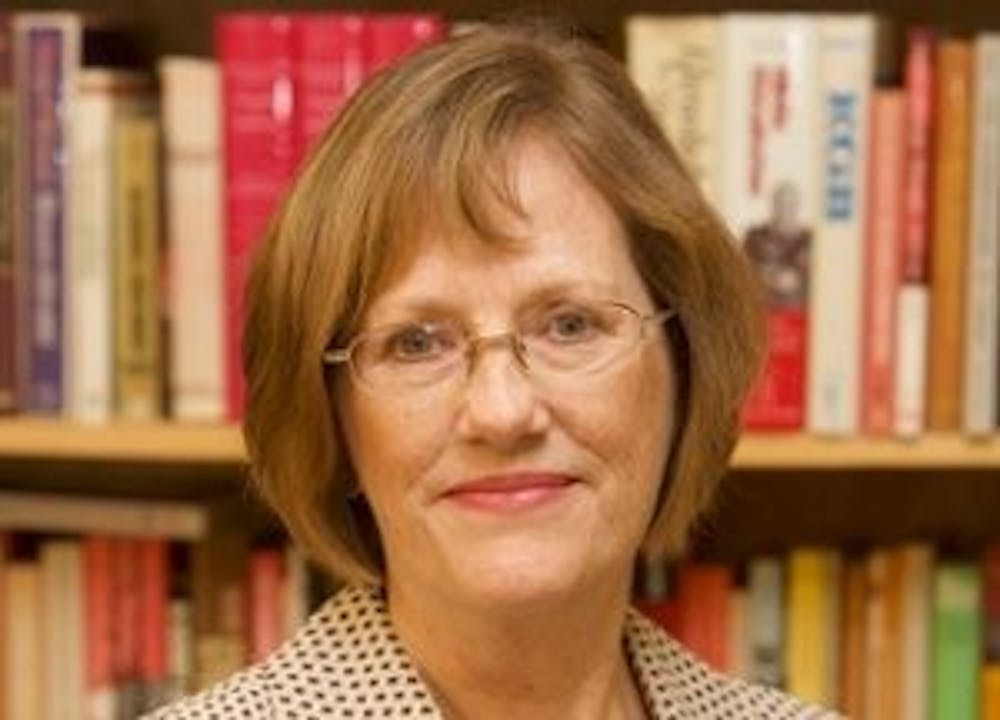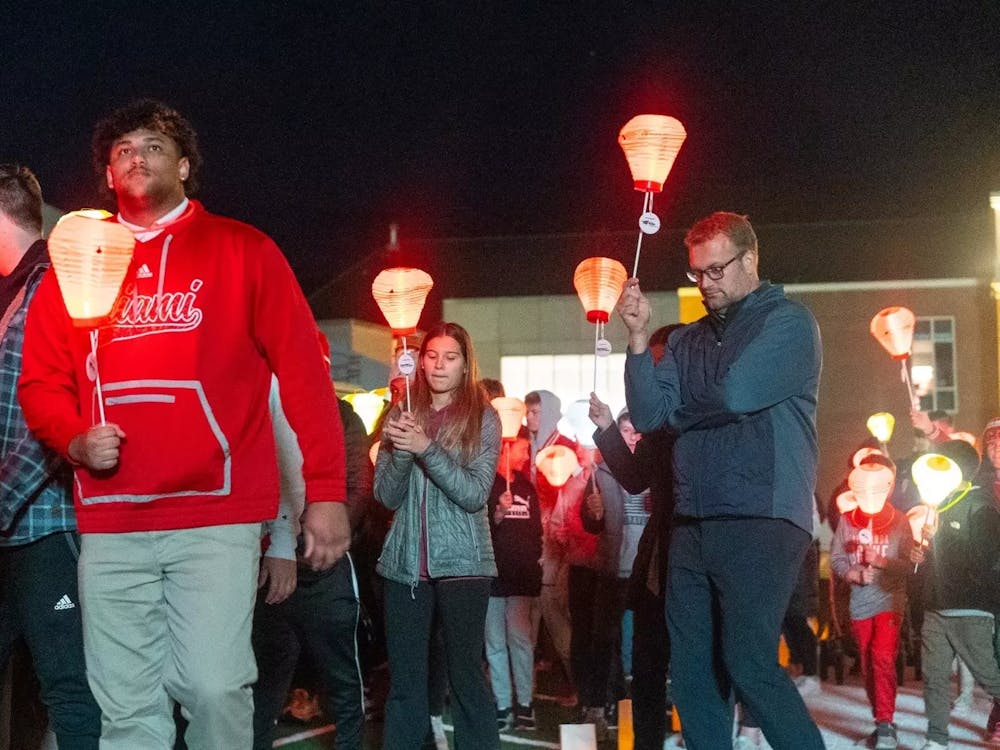It was December 2000 when Venelin Ganev arrived in Oxford for a second-round job interview at Miami University. He was being considered to join something called the Havighurst Center for Russian and Post-Soviet Studies.
At about 7:30 a.m. that morning, there was a knock on Ganev's hotel-room door.
"And there she was," he recalled. "Karen Dawisha."
As a graduate student in the 1990s, Ganev had admired Dawisha's work on the Russian electoral system. Now, he was sharing breakfast with her at Bell Tower Place as Dawisha laid out plans for the Havighurst Center, which she'd just been hired away from the University of Maryland to direct.
"At the time, there was no Center. There was Karen Dawisha and $10 million," Ganev said, referring to the bequest that founded the Center. "But she had this vision of what needs to be done."
That was typical of Dawisha, who died Wednesday at Woodland Country Manor care facility in Somerville, Ohio, after an 18-month battle with cancer. She was 68.
Dawisha hired Ganev and spent the next 16 years, until her retirement from Miami in 2016, building the Havighurst Center into an internationally renowned institution for scholars of Russia and post-Soviet Europe.
As the Center's founding director, she arrived in Oxford in 2000 and established programs for undergraduate and postdoctoral fellows, an annual Young Researchers Conference and a colloquium lecture series.
A highly respected scholar herself, with a Ph.D. from the London School of Economics, Dawisha published six books, including 2014's "Putin's Kleptocracy: Who Owns Russia?", a staple of modern-day Russian studies that earned international acclaim. Her other titles include "Eastern Europe, Gorbachev and Reform: The Great Challenge" and "Russia and the New States of Eurasia: The Politics of Upheaval".
"There's this famous photograph of her with Putin," Ganev said, "and it's obvious that he couldn't ignore her."
Nor could anyone at Miami: Dawisha became a founding co-president of Miami's American Association of University Professors (AAUP) advocacy chapter in 2015.
"She had the respect of pretty much everyone in the university. She was definitely a force to be reckoned with. At the same time, she was an incredibly nice person. I never saw or heard her say anything unpleasant or treat anybody with anything other than respect and kindness," AAUP secretary Deborah Lyons said. "Quite a high-wire act she pulled off."
Enjoy what you're reading?
Signup for our newsletter
And when Dawisha's term as AAUP co-president ended with her retirement, she expressed confidence in her successors.
"I remember her saying, 'Don't worry, I'll be around.' I was just thinking about that, how sad it is that she actually isn't going to be around for us anymore," Lyons said.
She'll be mourning Dawisha as a leader and as a friend.
"I knew her as this very gracious, energetic, interesting woman who also knew how to throw a party," Lyons said.
Dawisha, her husband Adeed said, was fun and funny. She liked to travel, for work and for pleasure. She enjoyed cooking and good beer. She was part of a group for women triathletes over the age of 50.
"She was fierce," said Stephen Norris, Havighurst Center interim director. "Fierce in her ideas, fierce in her advocacy for young scholars, fierce in her advocacy for studying this region, fierce in her fight against cancer at the end."
She read Russian newspapers, in Russian, on a daily basis. Her music tastes ranged from classical -- including Russian greats Rachmaninoff and Tchaikovsky -- to Billie Holiday and Brazilian jazz.
And she introduced her children, Nadia and Emile, to a wide range of culture.
"[My mother] was very much somebody who emphasized community, so we had people from all over the world at our house all the time for dinners and for parties," Nadia Dawisha said. "My brother and I grew up to be very open-minded because we were just surrounded by so many different types of people from all different walks of life."
Now, many of those people are sending Nadia their condolences.
"I'm getting messages and emails from Ph.D. candidates and students that she mentored all around the world saying that she really shaped the trajectory of their lives," Nadia Dawisha said.
Venelin Ganev, now a professor of political science, counts himself among them.
"If I can be half as good a mentor to the young professors that we now hire and nurture, half as good as she was with me, I'll consider that to be an absolute success," Ganev said.
Even Ganev's female peers in graduate school idolized Dawisha. For many of them, she was the first successful female political scientist they knew of.
"She was the role model," he said, "because that's the woman who made it."
That influence extended to Nadia, who earned her Ph.D last year and is an advocate for survivors of sexual violence.
"A lot of work that I do now definitely was inspired by her and by her insistence that we live in a world where women are taken as seriously as men," Nadia said.
While Nadia worked on her Ph.D in North Carolina, Karen would visit once a semester, taking her daughter grocery shopping and to get a massage.
"She was like a little Mary Poppins," Nadia said, laughing. "Sometimes she would come home and immediately come to my apartment and immediately start cleaning my apartment and rearranging everything."
Dawisha's maternal instincts extended to her friend, anthropology professor Linda Marchant, as well.
"She was very kind to me at a very low point in my life, and it was almost like she adopted me," Marchant said. "Like, 'You're going to come over to my house and have dinner,' and so I did."
Dawisha and Marchant often saw one another at faculty committee meetings. "If Karen were here," Marchant said, "she could probably tell you the day and the hour" when they became friends.
"My first response [when we met] was, 'She's the smartest person in the room,'" Marchant said. "She was a natural teacher. She could sort of unpack a problem and lay it out and then put it back together and at the end, you felt like you just had a lecture from a genius."
Often, those lectures came while Dawisha and Marchant were exercising together -- in a four-month span, the two tackled a half-marathon, a 10K and a 14K.
"That's how I got my private tutorial in Russian politics: walking and talking and exercising," Marchant said.
Their workout routine slowed when Dawisha was diagnosed with cancer in fall 2016, but she took pride in seeing the birth of her first grandchild, Emile's son Theo, who was born in October.
Adeed Dawisha said his wife's experience with cancer changed his perception of her.
"She had so much courage and fortitude. It really floored me. I knew that she was a remarkable woman before, but I did not know the extent of how remarkable she was until she was basically facing death," he said.
The proprietor of the rehab facility where Dawisha spent her last days pulled Adeed aside, telling him, '"Karen is -- will be -- a lesson to all of us. I have never seen a person dying with such dignity."
Ganev called Dawisha's friendship "one of the most precious relationships I've ever had."
"For me," he said, "I will always try to behave in ways that I think won't disappoint her."
Karen Dawisha died the morning of Wednesday, April 11 at Woodland Country Manor care facility in Somerville, Ohio, surrounded by family and friends. A memorial service will be held at St. Mary's Catholic Church at 11 a.m. on Saturday, May 5.
@MeganZahneis
zahneime@miamioh.edu




